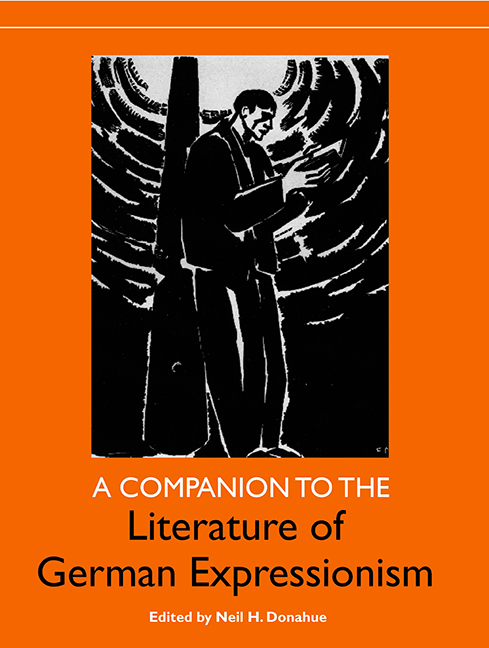
- Publisher:
- Boydell & Brewer
- Online publication date:
- April 2017
- Print publication year:
- 2005
- Online ISBN:
- 9781571136565
- Subjects:
- Literature, Area Studies, European Literature, European Studies
Our systems are now restored following recent technical disruption, and we’re working hard to catch up on publishing. We apologise for the inconvenience caused. Find out more: https://www.cambridge.org/universitypress/about-us/news-and-blogs/cambridge-university-press-publishing-update-following-technical-disruption

More than any other avant-garde movement, German Expressionism captures the aesthetic revolution of 20th-century modernity in all its contrasts and conflicts. In continuous eruptions from 1905 to 1925, Expressionism upset reigning practices in the arts, most vividly in painting and the visual arts. In the literature, a heady intellectualism combined with dramatic gesture, graphic visions, exuberant emotions and urgent proclamations to forge forceful styles of verbal expression. Expressionism introduced into art both visual and verbal a shockingly new intensity with many facets and many faces.This volume presents the literature of German Expressionism, which is far less known in the English-speaking world, with essays by leading scholars on Expressionism's philosophical origins, its thematic preoccupations, and its divergent stylistic manifestations by writers whose common bond is intensity and whose lines on the page read like the gouges of a woodcut: Georg Kaiser, Walter Hasenclever,and Ernst Toller in drama; Gottfried Benn, Georg Heym, Else Lasker-Schüler, and Georg Trakl in poetry; Alfred Döblin, Carl Einstein, and Carl Sternheim in prose, to name just a few. Against the background of the journals, exhibitions, and anthologies, the café meeting places and public life of Expressionism, the volume's highly focused, intrinsic analyses of texts and comprehensive overviews of extrinsic contexts (and of the most up-to-date research) shows the fervor and complexity of the period and its effulgent literary formations.
Neil H. Donahue is Professor of German and Comparative Literature at Hofstra University.
 Loading metrics...
Loading metrics...
* Views captured on Cambridge Core between #date#. This data will be updated every 24 hours.
Usage data cannot currently be displayed.